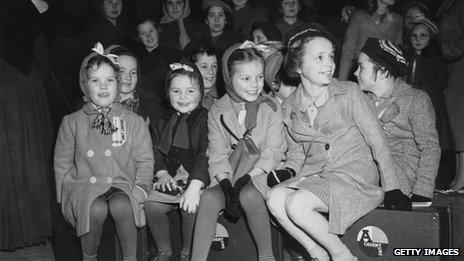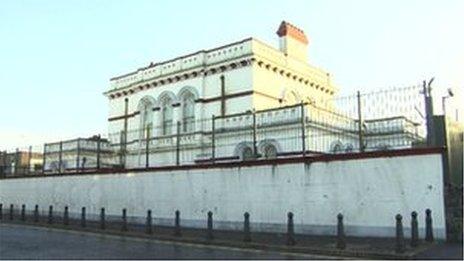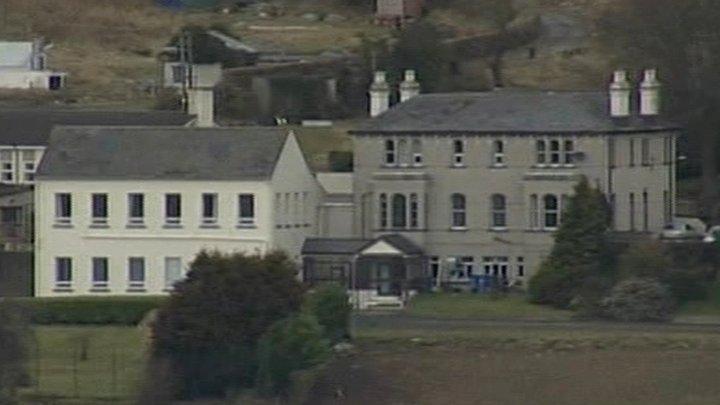Historical Institutional Abuse Inquiry: 131 NI children sent to Australia
- Published
Senior counsel to the Inquiry, Christine Smith QC, spoke during the opening of the second module of the inquiry
One hundred and thirty-one children from Northern Ireland, some as young as five, were sent to Australia as child migrants, an inquiry has heard.
The experiences of 50 of them will be heard by the Historical Institutional Abuse Inquiry (HIA) either by oral or written evidence.
It is examining the extent of child abuse in religious and state-run institutions in NI from 1922 to 1995.
A team from the inquiry has already made two trips to Australia.
HIA chairman Sir Anthony Hart said his staff had made the trip for two reasons - to enable those who lived there to have the same opportunity to describe their experiences as others, and to allow the HIA's legal team to gather a considerable amount of information from their witness statements.
The chairman said it would become clear during their evidence that many had suffered severe hardship and "grave" sexual and physical abuse in the institutions to which they were sent in Australia.
The majority of witnesses for the migration scheme will provide their evidence via video-link over a three-week period.
Senior counsel to the Inquiry, Christine Smith QC, said it was her understanding that the HIA Inquiry was the first to consider child migration from any part of the UK to Australia.
She told the inquiry, sitting in Banbridge, County Down, that many of those the inquiry had spoken to had lost all contact with their parents and siblings.
'Impact'
She said for some, they had been reunited with their families in later life, but for others, it was "too late" - their parents had either died or the reunions were "unsuccessful".
She said the inquiry would hear about the "impact" of child migration on their lives.
Ms Smith outlined to the inquiry where the children had been living before they were sent abroad.
"A few were sent to Australia by county welfare committees or by voluntary organisations, such as Dr Barnardos or Manor House children's home in Lisburn, the numbers sent by these institutions were small," she said.
"The great majority of those with whom the inquiry will be concerned came from four homes run by the Sisters of Nazareth in Northern Ireland - many came from Termonbacca and Nazareth House in Bishop Street in Derry, institutions about which the inquiry has already heard evidence.
"The remainder were sent from Nazareth House and Nazareth Lodge homes in Belfast."
She told the inquiry it had proved "extremely difficult" to obtain precise figures as to how many children from institutions in Northern Ireland, falling within the inquiry's terms of reference, were sent to Australia because "such records that were kept are not complete".
"From the information provided to the inquiry by the Sisters of Nazareth and from the inquiry's own searches in the Public Record Office of Northern Ireland (PRONI), it appears that approx 131 children may have been sent to Australia," she said.
"The Sisters of Nazareth sent 111.
"Twenty-six were sent from training schools, local authorities or voluntary homes, that figure includes a number of children who were put forward for emigration, but as the records are incomplete, it may be the case that some of these did not actually go. The HIA can only identify 20 who were sent with any degree of certainty."
The inquiry heard that the children who were in the care of voluntary institutions or state bodies in Northern Ireland were sent to Australia between 1922 and 1995.
'Brighter life'
Sir Anthony said some of the children had little recollection of their time in Northern Ireland or the circumstances surrounding their travel to Australia because at the time some were aged eight or under.
Michael McMoran said he is partially deaf because of the beatings he received at St Joseph's Catholic children's home
BBC NI reporter Martin Cassidy attended the inquiry on Monday.
"The idea was that they would have a new life, a brighter life and prospects in a developing country like Australia, and for some of them it was the start or continuation of abuse and a cold harsh regime which met them in Australia," he said.
"There were a number of occasions that there were visits and checking procedures done on some of the homes in Australia.
"Some were found to be deficient and indeed, as time went on, three of them were actually black listed by the authorities in the United Kingdom.
"Nevertheless, children from Northern Ireland continued to be shipped out in considerable numbers to Australia and they now have come forward to this inquiry."
Because many of the witnesses are now retired, the HIA decided, because of logistical and other difficulties, to hear their evidence via a live link.
Sir Anthony said although the HIA inquiry did not have the power to investigate the abuse they had suffered in institutions outside Northern Ireland, he said their experiences would not be "swept under the carpet".
Personal accounts
"I want to assure them that will not be the case," he said.
"Their evidence will be given in public, either in person or through their statements, and all of the evidence will be published on our inquiry website.
"Those who wish to familiarise themselves with these accounts will be able to do so, whether they live in Australia or elsewhere.
"In addition, at the conclusion of this module arrangements will be made to furnish these statements to the Royal Commission into Institutional Responses to Child Sexual Abuse which is presently carrying on its work in Australia.
"That will ensure that these matters are drawn to its attention."
The HIA is the biggest public inquiry into child abuse ever held in the UK and is investigating claims of physical, sexual, and emotional abuse, as well as childhood neglect.

Children were sent from across the UK to homes in Australia in the years after World War Two
More than 300 witnesses are taking part, including former residents who claim they were abused as children, the people who ran the institutions, health and social care officials and government representatives.
A total of 13 care homes and borstals in Northern Ireland are currently under investigation.
- Published23 October 2013
.jpg)
- Published12 August 2014

- Published25 February 2014
